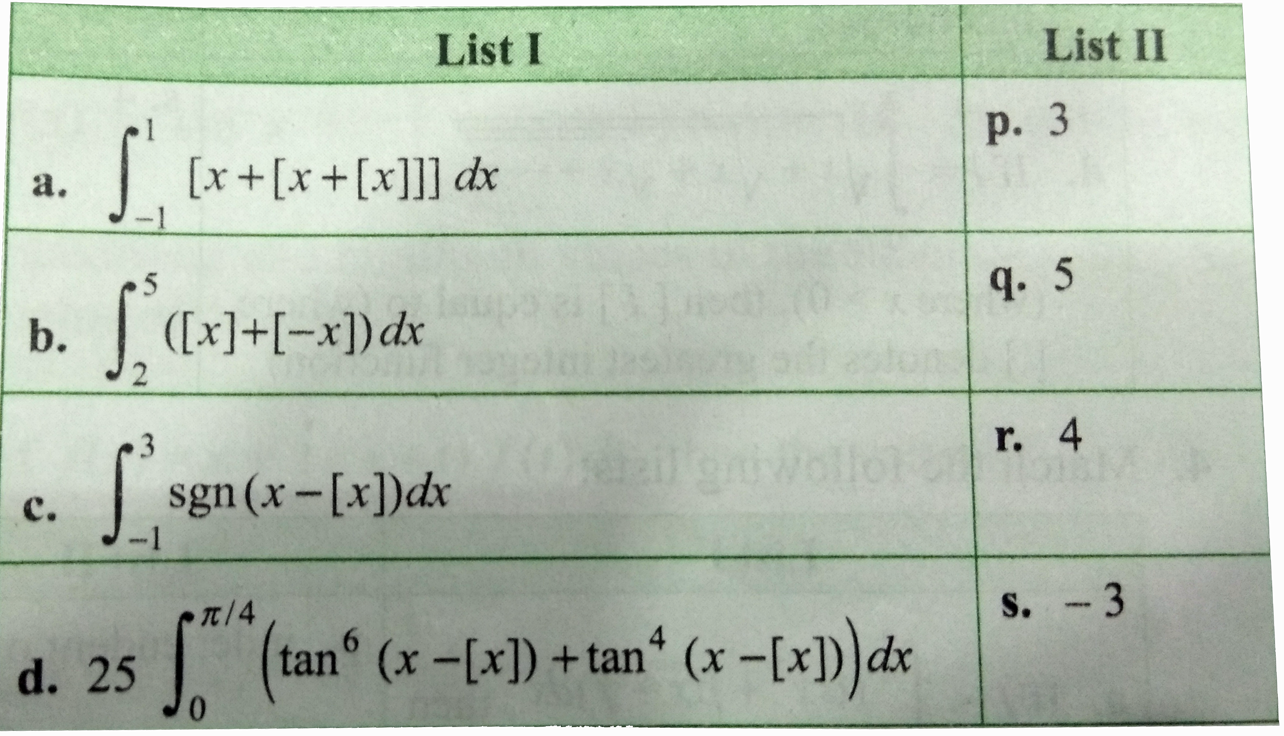f:[0,1)→R be a non increasing function then for αε(0,1)Solution in Bengali
α∫10f(x)dx≤∫α0f(x)dx
α∫10f(x)dx≥∫α0f(x)dx
α2∫10f(x)dx≤∫α0f(x)dx
√α∫10f(x)dx≥∫α0f(x)dx
The correct Answer is:A, C
∫α0f(x)dx………..1
Put x=αt
∴∫α0f(x)dx=α∫10f(αt)dt≥α∫10f(t)dt as αε(0,1)
Also α∫10f(t)dt≥α2∫10f(t)dt
∴∫α0f(x)dx≥α2∫10f(x)dx
Topper's Solved these Questions
- DEFINITE INTEGRATION BOOK - CENGAGE PUBLICATIONCHAPTER - DEFINITE INTEGRATION EXERCISE - LC_TYPE
31 Videos
- DEFINITE INTEGRATION BOOK - CENGAGE PUBLICATIONCHAPTER - DEFINITE INTEGRATION EXERCISE - MATRIX MATCH_TYPE
6 Videos
- DEFINITE INTEGRATION BOOK - CENGAGE PUBLICATIONCHAPTER - DEFINITE INTEGRATION EXERCISE - SCQ_TYPE
113 Videos
- CURVE TRACINGBOOK - CENGAGE PUBLICATIONCHAPTER - CURVE TRACINGEXERCISE - EXERCISES
24 Videos
- DETERMINANTBOOK - CENGAGE PUBLICATIONCHAPTER - DETERMINANTEXERCISE - Multiple Correct Answer
5 Videos
Similar Questions
y=f(x) satisfies the relation ∫x2f(t)dt=x22+∫2xt2f(t)dt
The range of y=f(x) is (a) [0,∞) (b)R (c)(−∞,0] (d) [−12,12]
View SolutionIf [.] denotes the greatest integer function, then match the following lists:

View SolutionLet f(x)=limn→∞1n((x+1n)2+(x+2n)2+……….+(x+n−1n)2)
Then the minimum value of f(x) is
View SolutionFind the derivative of y=sin2x−cosx
View SolutionIf x∈R,ai,bi,ci∈R for i=1,2,3 and ∣∣ ∣∣a1+b1xa1x+b1c1a2+b2xa2x+b2c2a3+b3xa3x+b3c3∣∣ ∣∣=0, then which of the following may be true ?
View SolutionLet f be a continuous function defined onto [0,1] with range [0,1]. Show that there is some c in [0,1] such that f(c)=1−c
View SolutionIf f be a continuous function on [0,1], differentiable in (0,1) such that f(1)=0, then there exists some c in(0,1) such that
View SolutionLet f:[0,1]rarr[0,1] be a continuous function such that f(f(x))=1f or allx in[0,1] then
View SolutionProve that the function f given by f(x)=x−[x] is increasing in (0, 1) .
View SolutionIf f be a continuous function on [0,1] differentiable in (0,1) such that f(1)=0, then there exists some c in(0,1) such that
View SolutionThe number of function f:[0,1]→[0,1] satisfying |f(x)−f(x)|=|x−y| for all x,y in [0,1]is
View Solutionf:[0,1)→R be a non increasing function the for αε(0,1)
View SolutionLet the set of all function f:[0,1]→R, which are continuous on [0,1] and differentiable on (0,1). Then for every f in S, there exists a c ∈(0,1) depending on f, such that :
View Solutionसतत् फलनों के प्रत्येक युग्म f,g:[0,1]→R जिनके लिए
अधिकतम f(x):xε[0,1]}= अधिकतम {g(x):xε[0,1]} है के लिए सत्य कथन है /हैं
View SolutionLet f be a continuous function defined onto [0,1] with range [0,1]. Show that there is some c in [0,1] such that f(c)=1−c
View Solutionf:[0,1)→R be a non increasing function then for αε(0,1)
View Solution
